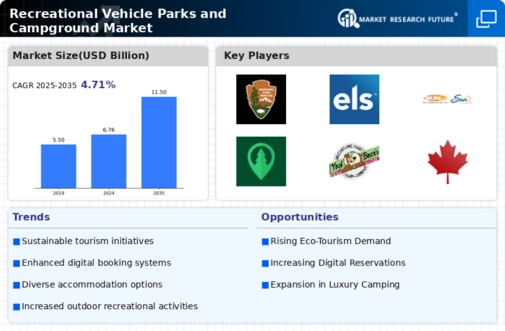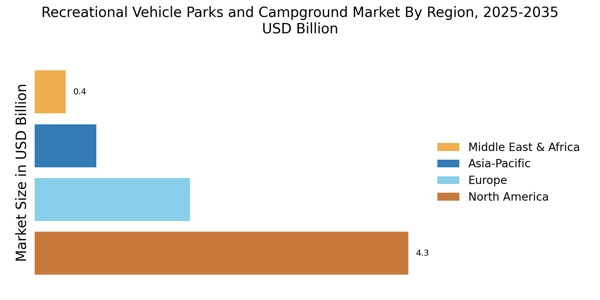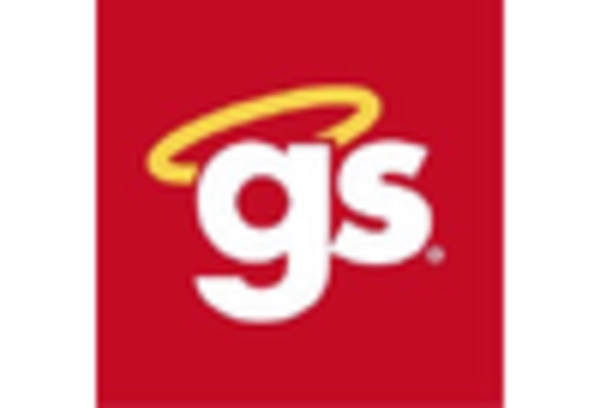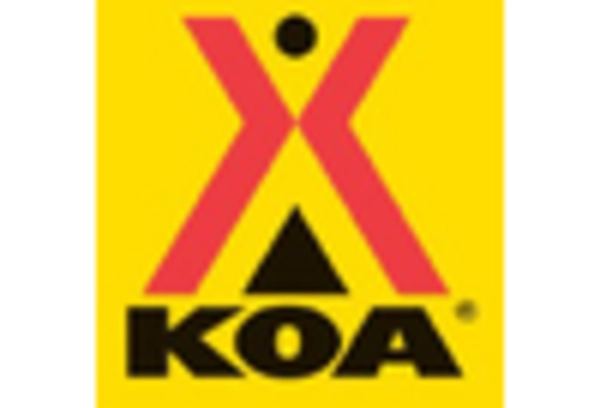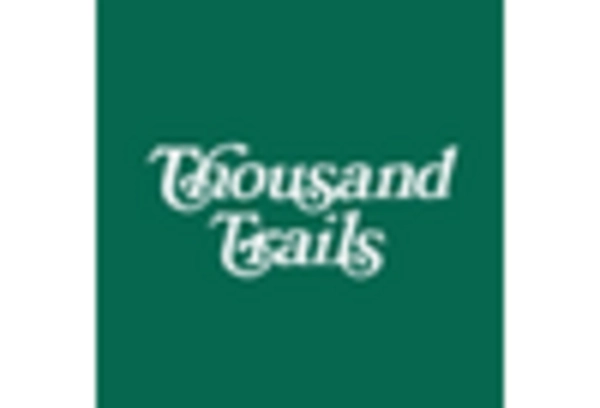Family-Oriented Travel Trends
The Recreational Vehicle Parks and Campground Market is witnessing a shift towards family-oriented travel experiences. Families are increasingly seeking destinations that offer activities and amenities suitable for all ages. This trend is reflected in the growing number of campgrounds that provide family-friendly facilities, such as playgrounds, organized activities, and educational programs. Research indicates that families are prioritizing bonding experiences and outdoor adventures, which RV parks and campgrounds are well-positioned to offer. As this demographic continues to grow, the industry is likely to adapt by enhancing its offerings to cater to the needs of families, thereby driving further growth in the Recreational Vehicle Parks and Campground Market.
Sustainability and Eco-Tourism
Sustainability has emerged as a pivotal driver within the Recreational Vehicle Parks and Campground Market. As environmental concerns gain traction, many consumers are seeking eco-friendly travel options. Campgrounds that implement sustainable practices, such as waste reduction, renewable energy sources, and conservation efforts, are likely to attract environmentally conscious travelers. Data suggests that eco-tourism is on the rise, with a growing number of campers prioritizing sustainability in their travel choices. This trend not only enhances the appeal of RV parks and campgrounds but also aligns with broader societal shifts towards responsible tourism. Consequently, the Recreational Vehicle Parks and Campground Market is poised to evolve, with an increasing number of facilities adopting green initiatives to meet consumer demand.
Growing Popularity of Road Trips
The trend of road trips is gaining momentum within the Recreational Vehicle Parks and Campground Market. As individuals and families seek flexible travel options, road trips offer an appealing alternative to traditional vacations. This resurgence in road travel is supported by the increasing availability of RV rentals and the expansion of campground networks. Data indicates that a substantial number of travelers are choosing to explore their surroundings by road, leading to a rise in demand for RV parks and campgrounds. This shift in travel behavior is likely to bolster the industry, as more people discover the joys of exploring diverse landscapes and attractions at their own pace.
Increased Outdoor Recreation Interest
The Recreational Vehicle Parks and Campground Market is experiencing a notable surge in interest for outdoor activities. This trend is driven by a growing awareness of the mental and physical health benefits associated with spending time in nature. Recent surveys indicate that a significant percentage of individuals are prioritizing outdoor experiences over traditional vacations. As a result, RV parks and campgrounds are becoming increasingly popular destinations for families and individuals seeking adventure and relaxation. The industry is likely to benefit from this shift, as more people opt for camping and RV travel as a means to escape urban environments. This heightened interest in outdoor recreation is expected to contribute to the expansion of the Recreational Vehicle Parks and Campground Market, with new facilities being developed to accommodate the influx of visitors.
Technological Advancements in Camping
The integration of technology within the Recreational Vehicle Parks and Campground Market is transforming the camping experience. Innovations such as mobile apps for reservations, online check-ins, and enhanced connectivity options are becoming standard features in many parks. These advancements not only streamline operations but also improve customer satisfaction by providing convenience and accessibility. Furthermore, the rise of smart RVs equipped with advanced technology is likely to influence consumer preferences, as travelers seek modern amenities during their outdoor adventures. As technology continues to evolve, the Recreational Vehicle Parks and Campground Market may witness a shift in consumer expectations, prompting facilities to adapt and innovate to remain competitive.


